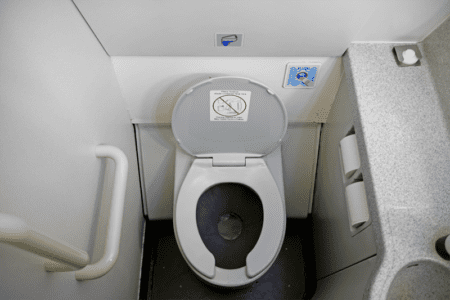By UOAA Advocacy Manager Jeanine Gleba
Imagine having your ostomy leak during a flight and being denied access to the restroom.
As part of our Advocacy Agenda, UOAA strives to protect the rights of people with an ostomy or continent diversion and eliminate discrimination at school, work, and elsewhere in their lives to ensure they are accepted as normal, healthy individuals. At the national level, we advocate for legislation that will improve their rights, protections and access. We currently have an opportunity to advocate for new protections and equal access for airline passengers with disabilities and improve air travel experiences.
We’ve shared in the past the answer to the question “Does an ostomy qualify as a disability?” in this blog. Not all disabilities are visible. People living with an ostomy, which is a physical impairment that affects daily living and requires a prosthetic to replace the function of the bowel or bladder, are a hidden disability group. People living with an ostomy should have airplane rights too.
Background
The Americans with Disabilities Act does not cover disability rights in air travel. In 1986 President Ronald Reagan signed the Air Carrier Access Act (ACAA) into law.
Every five years, Congress must renew the authorization for the Federal Aviation Administration (FAA). This provides an opportunity for federal lawmakers to examine the airline industry and propose any reforms or updates. The last renewal was in 2018 and it mandated the creation of a Bill of Rights for passengers with disabilities. An advisory committee was formed to advise the Secretary of Transportation on the air travel needs of these passengers.
In 2022 the Department of Transportation released “Airline Passengers with Disabilities Bill of Rights”. This document describes the fundamental rights of air travelers with disabilities under the ACAA and its implementing regulation, 14 Code of Federal Regulations (CFR) Part 382. It is important to understand that this Bill of Rights does not expand the rights of air travelers with disabilities. They are a helpful summary of the existing law under the ACAA. For example as explained in the seventh right, ostomates may not be aware that airlines must allow assistive devices as carry-ons in the cabin free of charge consistent with safety rules. This includes medical devices and/or a personal amount of medication that assist the passenger with his or her disability. Your ostomy supplies are medical devices.
Present Opportunity for Advocacy
Despite the provision of the ACAA that prohibits disability-based discrimination in air transportation, many passengers with disabilities continue to have challenging and frustrating experiences. They experience significant barriers to and with traveling by air such as damaged assistive devices, inaccessible restrooms, inappropriate treatment of service animals and inadequate disability awareness and sensitivity training of airline and contractor personnel. 
Enforcement of ACAA protections is limited to administrative action and civil fines. Unlike most other civil rights laws, the ACAA lacks a guaranteed private right of action; that is the ability to sue in court. Consequently, people with disabilities typically receive little if any compensation for personal injury or damaged property such as wheelchairs.
The current authorization expires at the end of September 2023, so Congress is preparing to write a new 5-year authorization bill and vote on it in the coming months.
Representative Dina Titus (D-NV- 1) and Senator Tammy Baldwin (D-WI) have introduced the Air Carrier Access Amendments Act, which is a bill to protect the rights of passengers with disabilities in air transportation. To read the bill text and see the list of current co-sponsors go to H.R. 1267/S. 545. The Act calls for improved air travel safety, accessibility and accountability. The Act has meaningful provisions such as:
- Establishes a private right of action, allowing passengers with disabilities to sue airlines for damages in civil court
- Ensures new airplanes are designed to accommodate the needs of people with disabilities by requiring airlines to meet defined accessibility standards. These standards will address safe and effective boarding and deplaning, visually accessible announcements, seating accommodations, lavatories, and better stowage options for assistive devices, which airlines would have to comply with five years after those standards were issued
We believe all airline personnel should receive sensitivity and awareness training on medical conditions that might need urgent access to a restroom during a flight. Lack of access to one during an unexpected pouch leak can result in an embarrassing and unnecessary accident. All travelers with disabilities should be treated with dignity. Additionally, it is important for the ostomy community to have access to airline lavatories that provide accommodations (such as a shelf to place their medical supplies) for emptying/changing/disposing of an ostomy pouch and/or catheter in a safe and clean environment.
The ACAA must be updated to improve access to air transportation for individuals with disabilities. UOAA joins with other patient and disability organizations to support the Air Carrier Access Amendments Act of 2023 (H.R. 1267/S. 545).
No person living with an ostomy should ever be discouraged from traveling, whether for work, to see family and friends, take a vacation, or go on a journey around the world.
Get Involved
Below are ways you can get involved:
- Request that your elected officials become co-sponsors of the Air Carrier Access Amendments Act of 2023 (H.R. 1267/S. 545) and ask them to include the Act in the next FAA authorization bill. Take action here.
- Organizations such as United Spinal and wheelchair users are demanding airline accessibility. They are sharing their #JustPlaneWrong stories on social media. Share your experience on social media using hashtags such as #JustPlaneWrong, #TravelwithDignity and #AirTravelRights and tag @UOAA on Twitter or @UOAA_ostomy on Tik Tok or @uoaa_ on Instagram.
- We need many people to join the cause. Please spread the word with your connections on social media, email contacts and encourage your family, friends, and colleagues to engage with us. You can share this link.
Together we can protect the rights of passengers with disabilities in air travel!



